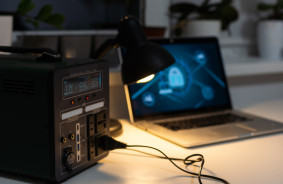Samsung has introduced new Galaxy Buds 3 Pro and Galaxy Buds 3 headphones. The company moved away from the exclusive design of previous generations and made them somewhat similar to Apple AirPods, especially in white color.
Both headphone models also have a metallic gray variant, which in turn is reminiscent of the Tesla Cybertruck. Samsung's press release states that the stem design provides better comfort and ear retention. Galaxy Buds controls are now mostly identical to those of AirPods Pro.
Buds 3 Pro priced at $249.99 have a thin LED indicator on each earbud that can light up to show Bluetooth connection status, and can also remain on constantly. The Pro version has silicone ear tips, while the regular Buds 3 for $179.99 have an open design for people who do not like the feeling of blocked ears.
Both models offer active noise cancellation. Audio quality and power may be better on the Buds 3 Pro, as they contain dual drivers in each earbud, while the standard Buds 3 have only one driver. Buds 3 Pro now have adaptive noise cancellation, so ANC will automatically adjust according to the environment. When the headphones detect important sounds, such as sirens, they temporarily turn off noise cancellation.
The new Samsung headphones have IP57 dust and water resistance and support wireless charging. Samsung's proprietary Bluetooth codec is now capable of transmitting wireless audio streams up to 24-bit / 96 kHz. Full Multipoint is still absent - the headphones only offer automatic switching between Samsung devices.
Buds 3 Pro have slightly longer battery life - up to 6 hours or only 26 hours with ANC, including recharging from the case. Buds 3 can operate for 5 and 24 hours respectively - or 6 and 30 hours if ANC is not enabled. Samsung claims that the quality of voice calls has significantly improved thanks to the inclusion of ultra-wideband communication - a feature that has already appeared on competitors' Pixel Buds Pro. Samsung Buds 3 Pro and Buds 3 headphones are available for pre-order today and will be released on July 24.
Source: The Verge














Comments (0)
There are no comments for now